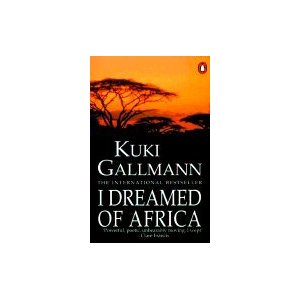I think it started with Chinua Achebe’s Things Fall Apart. My obsession with African literature, that is. So, when I saw a tattered copy of Out of Africa at a used book sale this past year I grabbed it without a second thought and tossed it into my already teeming box of books. It wasn’t until much later when I’d unpacked

and was revisiting my purchases that I realized I hadn’t bought Isak Dinesen’s Out of Africa but rather Kuki Gallmann’s I Dreamed of Africa. “International Bestseller” was splashed across the cover so I thought, what the hey? When will I learn!
I don’t want to be too harsh in this review since this book still falls within the category that I hold dear but I have very few good things to say about it. It started off well (that’s one) – a young Italian woman is crippled in an accident and finds herself starting a new life in Kenya. Sounds pretty exciting to me, like a story I could live vicariously through. The story never gets going though. It is just a series of events and people strung together in time.
I didn’t feel Kuki’s pain and struggle with her new handicap; she simply tells the reader “it was hard, but then the doctor fixed my leg” (I’m paraphrasing) so the opportunity for the reader to empathize with her is largely lost. The author-reader connection is further hampered by Kuki’s ability to tell her story – her life in Kenya reads more like a book report written by someone in grade school then a memoir. This critique comes from personal experience (not that I’ve tried writing a memoir. Yet). Somewhere in elementary school my teacher told me not to just retell the story, write how it made me feel, what my thoughts were, what I thought the author was trying to say as otherwise I was just writing a report, not a personalized review. This advice could have served Ms. Gallmann well.
Writing a memoir in chronological order is somewhat necessary if not the point. We, the readers, are supposed to grow with the characters and see how they  change in accordance with the events of their life. Kuki’s memoir, however, is organized along a timeline so rigid there is no room for deviation. Instead of grouping events together in order to convey a message, significant events were interrupted by unrelated activities like a new neighbour moving in or a plane ride over the Great Rift Valley. Important or significant experiences? Perhaps, but not as isolated events.
change in accordance with the events of their life. Kuki’s memoir, however, is organized along a timeline so rigid there is no room for deviation. Instead of grouping events together in order to convey a message, significant events were interrupted by unrelated activities like a new neighbour moving in or a plane ride over the Great Rift Valley. Important or significant experiences? Perhaps, but not as isolated events.
As a result, I was unable to build the intended attachment to characters, central or otherwise, and had to rely on the “facts” Kuki offered instead of making my own discoveries. Her son, for example. I understood (ad nauseam) that he loved snakes but I couldn’t really get an idea of who he was because a) her anecdotes were weak and fluffy and b) she used lines like “[Ema] was quiet and independent”; basal descriptions that didn’t serve to provide me with a sense of who the boy was.
I initially thought Kuki’s writing was going to be a strong point in the book (that’s two positive things?) because there are some beautifully descriptive lines early on but by the last third of the book when I encountered lines like “A life, like a concert, is made of high and low notes, of pauses in the elation and of peaks of reverberating, deafening heartbeats” they stood out like a sore thumb. They were in such stark contrast to the bulk of her writing that instead of “waxing poetic” her words instead seemed trite and forced.
My opinions of this latest read diverge widely from the popular opinions at the time of publication. Maybe it’s an issue of timeliness – there have been a long line of memoirs out of Africa since the year 2000 – or maybe its just as Oscar Wilde said. “Everything popular is wrong.”
~ kate
